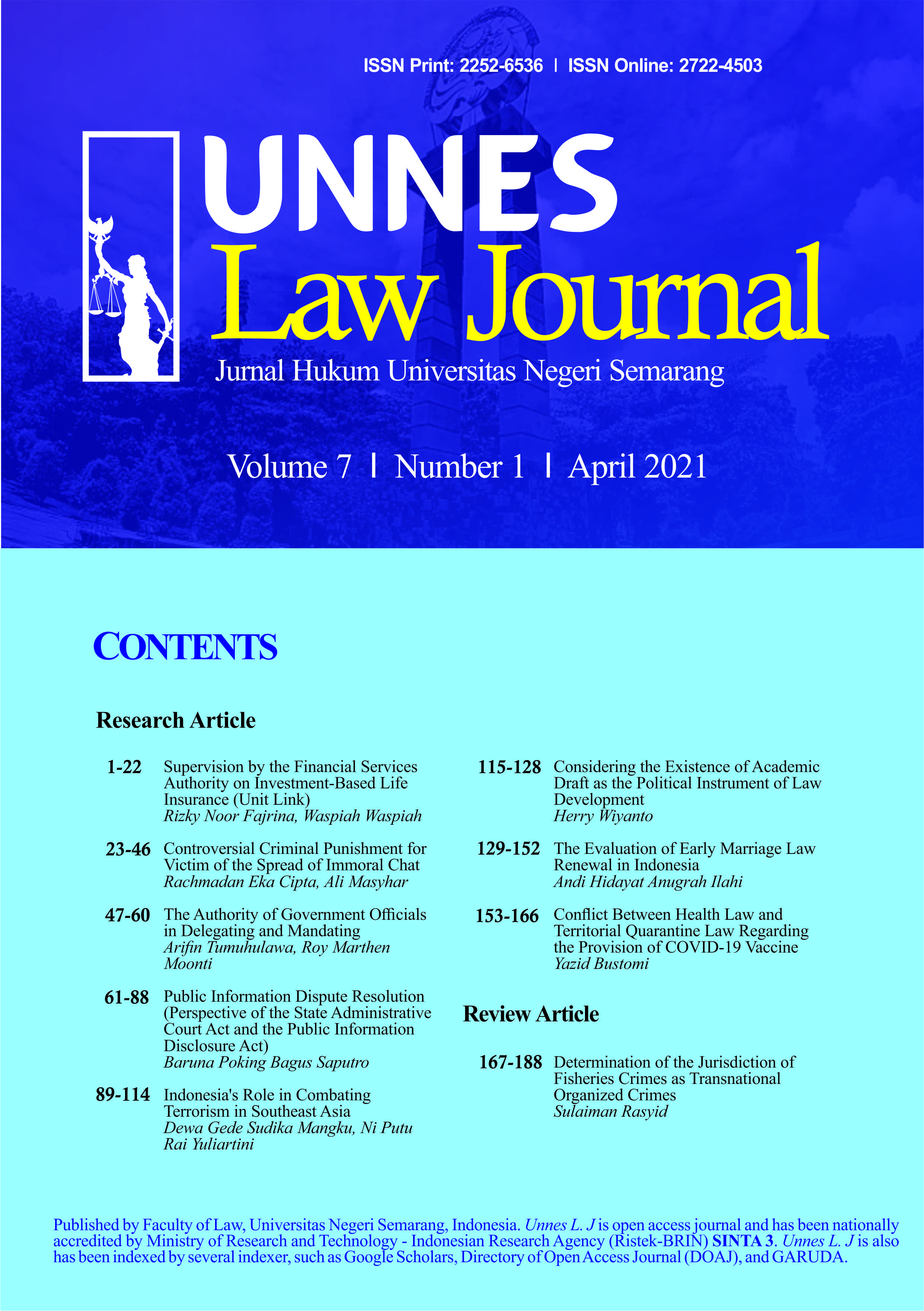Controversial Criminal Punishment for Victim of the Spread of Immoral Chat Criminal Law, Law and Technology, Victimology
Main Article Content
Abstract
The purpose of this research is to (1) analyze the Supreme Court's consideration of victims of the spread of sordid chatter in the Supreme Court's decision Number 574K / PID.SUS / 2018, and (2) analyze the arguments of the Public Prosecutor regarding the offense Article 27 paragraph (1) juncto Article 45 paragraph (1) of the Information and Electronic Transaction Law in decision No. 574K / PID.SUS / 2018. This type of research uses qualitative methods with a normative juridical approach. In this method, secondary data uses the decision of the Mataram District Court Number: 265 / Pid.Sus / 2017 / PN.MTR and the decision of the Supreme Court Number 574 K / Pid.Sus / 2018. Primary data to support this research were obtained from interviews of the Supreme Court of the Republic of Indonesia and the Institute for Criminal Justie Reform. Results and discussion of research (1) The values ​​underlying the Supreme Court in the Supreme Court's decision Number 574K / PID.SUS / 2018 and (2) the Prosecutor's argument The Public Prosecutor related to offense Article 27 paragraph (1) jo Article 45 paragraph (1) of the Information and Electronic Transaction Law in the decision No. 574K / PID.SUS / 2018. Overall it can be concluded that (1) The value underlying the Supreme Court in passing this decision is that the judge tries to apply the benefits of the law. (2) The Public Prosecutor's Arguments in indicting or in prosecution cannot describe the offenses that are charged to the defendant, this is a serious record in the first-level court of the indictment and the demands of the Public Prosecutor are declared unproven on the defendant.
Article Details
References
Arifin, R., Masyhar, A., & Amira, B. (2020). The Invisible Big Waves: How Indonesia Combat with Radicalism and Terrorism in Global Perspective. HIKMATUNA, 6(1), 105-121.
Azhar, H. F. (2020). Menakar Keadilan Putusan Hakim Terhadap Kasus Baiq Nuril Perspektif MaqÄá¹£id Asy-Syari’ah. Jurnal Ilmiah Mahasiswa Raushan Fikr, 9(1), 38-56.
Djojorahardjo, R. H. (2019). Mewujudkan Aspek Keadilan dalam Putusan Hakim di Peradilan Perdata. Jurnal Media Hukum dan Peradilan, 88-100.
Effendi, E. (2011). Hukum Pidana Indonesia, Suatu Pengantar. Bandung: Refika Aditama.
Febriana, A., Rif'an, M., & Maghfira, T. V. (2020). Baiq Nuril’s Amnesty Impacts on Legal Certainty in Indonesia. Unram Law Review, 4(1), 40-46.
Harahap, M. Y. (2000). Pembahasan Permasalahan dan Penerapan KUHAP. Jakarta: Sinar Grafika.
Hardinanto, A., & Jannah, Z. (2019, November). The Usage of Forensic Computer Report on The Case of Baiq Nuril Maknun. In International Conference on Social Science 2019 (ICSS 2019) (pp. 595-598). Atlantis Press.
Lamintang, P.A.F. (1984). Dasar-Dasar Hukum Pidana Indonesia. Bandung: Sinar Baru.
Manthovani, R., & Tejomurti, K. (2019). A Holistic Approach of Amnesty Application for Baiq Nuril Maknun in the Framework of Constitutional Law of Indonesia. Yustisia Jurnal Hukum, 8(2), 277-291.
Margono, M. (2012). Asas Keadilan,Kemanfaatan dan Kepastian Hukum dalam Putusan Hakim. Jakarta: Sinar Grafika.
Masyhar, A. (2008). Pergulatan Kebijakan Hukum Pidana dalam Ranah Tatanan Sosial. Semarang: Unnes Press.
Masyhar, A. (2017). Formulation Model of Retroactive in the World (Comparative Study with Indonesian Penal Code). South East Asia Journal of Contemporary Business, Economics and Law, 12(4), 65-69. https://www.seajbel.com/wp-content/uploads/2017/05/LAW-36.pdf
Masyhar, A. (2019). Balancing Principles of Legality in Teaching Legal Studies. The Indonesian Journal of International Clinical Legal Education, 1(3). https://doi.org/10.15294/iccle.v1i01.20709
Masyhar, A. (2019). Regeneration Modus and Strategy of Terorism. South East Asia Journal of Contemporary Business, Economics and Law, 18(4), 13-17. https://seajbel.com/wp-content/uploads/2019/05/SEAJBEL-18_39.pdf
Mertokusumo, S. (2005). Mengenal Hukum Suatu Pengantar. Yogyakarta: Liberty.
Munte, H. (2017). Model Penyelesaian Sengketa Administrasi Pilkada. Medan: Puspantara.
Nopriadi, R. (2018). Analisis Putusan MA No. 574. K/PID. SUS/2018. pada Kasus Baiq Nuril Maknun Ditinjau dari Sosiologi Hukum (Amnesti Presiden). Jurnal Sagacious, 4(2), 73-80.
Priyatno, D. (2017). Pertanggungjawaban Pidana Korporasi Dalam Peraturan Perundang-Undangan Khusus Di Luar KUHP Di Indonesia. Jakarta : Sinar Grafika.
Prodjohamidjojo, M. (1997). Memahami Dasar-Dasar Hukum Pidana. Jakarta: Pradnya Paramita.
Ramli, S., Dhiarafah, F. A., & Merrita, D. (2019). A Case of Baiq Nuril in Media: Sara Mills’ Critical Discourse Analysis. Lingua: Jurnal Ilmiah, 15(2), 101-115.
Rohmah, F., & Natangsa Surbakti, S. H. (2020). Analisis Tindak Pidana ITE Berdasarkan Perkara Baiq Nuril (Doctoral dissertation, Universitas Muhammadiyah Surakarta).
Sari, N. L. A. (2019). Analisis Putusan Mahkamah Agung No. 574. K/Pid. Sus/2018 Pada Kasus Baiq Nuril Maknun (Ditinjau dari Konsep Keadilan). Media Keadilan: Jurnal Ilmu Hukum, 10(1), 1-16.
Sianturi, S. R. (1996). Asas-Asas Hukum Pidana di Indonesia dan Penerapannya. Jakarta: Alumni Ahaem-Petehaem.
Solihah, E. N., & Masyhar, A. (2021). The Implementation of Capital Punishment in Indonesia: The Human Rights Discourse. Journal of Law and Legal Reform, 2(2), 321-328. https://doi.org/10.15294/jllr.v2i2.46625
Sulistyawan, A. Y. (2018). Berhukum Secara Objektif Pada Kasus Baiq Nuril: Suatu Telaah Filsafat Hukum Melalui Kajian Paradigmatik. Humani (Hukum dan Masyarakat Madani), 8(2), 187-200.
Wantu, F. (2012). Mewujudkan Kepastian Hukum, Keadilan dan Kemanfaatan dalam Putusan Hakim di Peradilan Perdata. Jurnal Dinamika Hukum, 12(3), 479-489.
